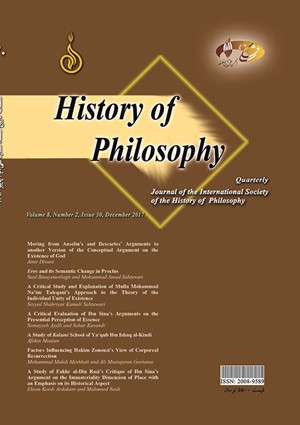Moving from Anselm’s and Descartes’ Arguments to another Version of the Conceptual Argument on the Existence of God
Subject Areas : Geneology of philosophical schools and Ideas
1 -
Abstract :
The conceptual argument which is called the “ontological argument” in Western philosophy moves from a concept in the mind to its external referent. This argument is only about a concept which exclusively applies to God. Philosophers unanimously concede that the move from the (mere) concept to the referent is not allowed; at the same time, they agree that the concept representing God, like the existence of God, which is unique and different from that of any other existent, is different from all other concepts and has no parallel among them. Anselm and Descartes have presented the conceptual argument in different ways. Irrespective of the truth or falsity of the leveled criticisms against these two arguments, the present paper suggests another version of this argument (conceptual argument) which, under the necessary conditions, will attain its end more conveniently. This concept enjoys certain features, among which representation is of great importance. The intended concept is the same concept of existence; an intelligible concept which is a part of the nature of the intellect and stands at a distance from any kind of association with whatness and non-existence. After interpreting this argument and exploring the writings of Muslim philosophers, including Mulla Sadra, the author concludes that some of his words could be used as proof for the truth of this claim. If this argument yields fruit, it demonstrates not only the general capability of the intellect in knowing God and His Attributes but also the possibility of providing a new version of some of the objectives of the great figures in the fields of philosophy and gnosis.
آنسلم، پروسلوگيون (خطابهاي در باب اثبات وجود خدا)، ترجمة افسانه نجاتي، انتشارات قصيده¬سرا، چ1، 1386.#
ابنسينا، حسين بن عبدالله، الشفا، الهيات، منشورات مکتبه آية الله العظمي المرعشي النجفي، 1404 ق.#
ادواردز، پل، خدا در فلسفه، ترجمه بهاءالدين خرمشاهي، مؤسسه مطالعات و تحقيقات فرهنگي، چ3، 1372.#
اسپينوزا، بنديکت، شرح اصول فلسفه دکارت و تفکرات مابعدالطبيعي، ترجمة محسن جهانگيري، سازمان مطالعه و تدوين کتب علوم انساني دانشگاه¬ها (سمت)، چ1، 1390.#
جوادي آملي، عبدالله، تببين براهين اثبات خدا، مرکز نشر اسراء، چ1، بي¬تا.#
جوادي آملي، عبدالله، رحيق مختوم، بخش يکم از جلد اول، مرکز نشر اسراء، چ1، 1375.#
دکارت، رنه، تأملات در فلسفه اولي، ترجمه احمد احمدي، مرکز نشر دانشگاهي، چ11، 1392.#
سبزواري، ملاهادي، اسرار الحکم، کتابفروشي اسلاميه، چ2، 1362.#
لاهيجي، عبدالرزاق، گوهر مراد، نشر سايه، چ1، 1382.#
لاهيجي، ملامحمدجعفر، شرح رساله المشاعر، مکتب الاعلام الاسلامي، چ2، بي¬تا.#
ملاصدرا، الحکمة المتعالية في الاسفار العقلية الاربعة، انتشارات مصطفوي، ج1، چ2، 1368.#
ملاصدرا، الحكمة المتعالية في الاسفارالعقلية الاربعة، تصحيح و تحقيق غلامرضا اعواني؛ باشراف و مقدمه استاد سيدمحمد خامنهاي، ويراستار مقصود محمدي، تهران، انتشارات بنياد حكمت اسلامي صدرا، چ1، 1383.#
ملاصدرا، شرح و تعليقه بر الهيات شفا، تصحيح، تحقيق و مقدمه نجفقلي حبيبي؛ باشراف استاد سيدمحمد خامنهاي، انتشارات بنياد حکمت اسلامي صدرا، چ1، 1382.#
ملاصدرا، العرشيه، ترجمة غلامحسين آهني، انتشارات مهدوي، بي¬تا.#
ملاصدرا، المبدأ و المعاد، تصحيح، تحقيق و مقدمه محمد ذبيحي و جعفر شاهنظري؛ باشراف استاد سيدمحمد خامنهاي، انتشارات بنياد حکمت اسلامي صدرا، ج1، چ1، 1381.#


